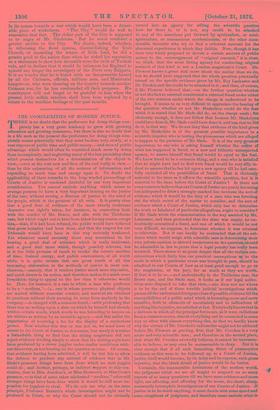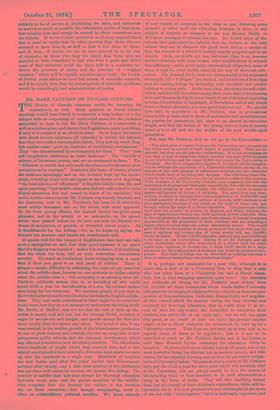THE COMPLEXITIES OF MODERN JUSTICE.
THERE, is no doubt that the preference for doing things com- pletely has a very great tendency to grow with growing education and growing commerce, but there is also no doubt that in a life such as the present the preference for doing things com- pletely means practically that they must be done very slowly, at a vast expense of public time and public money,—and even of public advantage which would often be consulted much more by doing them incompletely, and neglecting many of the less promising clues which present themselves for a determination of the object in view,—even at the cost now and then of the end really in view,— than by this exhausting of all the sources of information, and expending so much time and energy upon it. No doubt the applicability of these remarks to the long-winded proceedings of Courts of Justice is rendered doubtful by one very important consideration. You cannot exclude anything which seems to average persons to have a very important bearing on the justice of the case, without sowing a distrust of justice in the mind of the people, which is the greatest of all evils. It is pretty clear that a good deal of evidence of the most utterly irrelevant character was rightly taken, for instance, in connection both with the murder of Mr. Bravo, and also with the Tichborne case, but which ought not to have been taken for any reason except this,—that, if it had been refused, the public would have believed that gross injustice had been done, and that the respect for our Tribunals would have been in this way seriously weakened. Yet whatever moral necessity there may sometimes be for hearing a good deal of evidence which is really irrelevant, and a good deal more which, though possibly relevant, has in it too little promise of result to render the certain sacrifice of time, trained energy, and public convenience, at all worth while, it is quite certain that one great result of all this increasing elaboration in the methods of justice is most mis- chievous,—namely, that it renders justice much more expensive, and much slower in its action, and therefore makes it a much more formidable thing to appeal to the law than it otherwise would be. Here, for instance, is a case in which a man who professes to be a " inedium,"--i.e., one in whose presence physical objects are moved without muscular contact, and answers are obtained to questions without their seeming to come from anybody in the company,—is charged with a common fraud,—with professing that there was no writing upon a slate on which he himself had already written certain words, which words he was intending to impose on his visitors as written by an invisible agency,—and this under the expectation of receiving a fee for the display of a mysterious power. Now whether this was or was not so, we must leave of course to the Court of Justice to determine, but surely it is rather a formidable thing to find that the sitting magistrate did not reject evidence tending simply to show that the writing might have been produced by a clever juggler under similar conditions with- out discovery, as not bearing on the question at issue. Of course, that evidence having been admitted, it will be but fair to allow the defence to produce any amount of evidence that in Mr. Slade's presence things have been done which no such juggler could do ; and further, perhaps, as indirect support to this con- clusion, that in Mrs. Jencken's, or Miss Showers's, or Miss Cook's presence, or in that of some other celebrated "medium," other still stranger things have been done which it would be still more im- possible for jugglers to rival. We do not see why, on the same principle, Professor Barrett's whole investigation might not be produced in Court, or why the Court should not be virtually turned into an agency for sifting the scientific question how far there is, or is not, any credit to be attached to any of the assertions put forward by spiritualists, or semi- spiritualists, or unconscious cerebmtionists, or the other innu- merable theorists who try to find a coherent account for the abnormal experiences in which they dabble. Now, though it has been very wisely proposed to devote a certain amount of public money to the encouragement of "original research," it is clear, we think, that the most fitting agency for conducting original research of that kind is not a London magistrate's Court. Mr. Flowers knows a great deal more about the matter than we do, but we should have supposed that the whole question practically turned on the specific evidence given by Mr. Ray Lankester and Dr. Donkin and the credit to be attached to it ; and then, of course, if Mr. Flowers believed that,—on the further question whether or not the fact so asserted constituted a criminal fraud under either of the two statutes under which the charge is understood to be brought. It seems to us very difficult to appreciate the bearing of the question whether or not Mr. Maskelyne could do the feat which it is stated that Mr. Slade did do, on the charge made ; for obviously enough, it does not follow that because Mr. Maskelyne could have done it, Mr. Slade could have done it, still less that he did do it, in that way. We do not deny that evidence of the kind given by Mr. Maskelyne is of the greatest possible importance to a scientific inquirer who is testing the phenomena which are alleged to happen in the presence of Mr. Slade. It is of the very greeted importance to one who is asking himself whether the seiret of what has happened is fraud, or a new and hitherto unsuspected agency, to assure himself that fraud would be equal to the feat. We know fraud to be a common thing, and a man who is satisfied that he might have had to deal with fraud would be very silly in- deed to assume that he has hit upon a new agency till he had care- fully excluded all the possibilities of fraud. That is obviously material to the issue as it affects the scientific question, but is it material to the issue before the Court of 'Justice ? Is there not some reason to believe that our Courts of Justice are yearly becoming less indisposed to draw a strongly-marked line between the sort of evidence which it would be the duty of a man who was ferreting out the whole secret of the matter to consider, and the sort of evidence which a Court of Justice, which only has to determine the truth or falsehood of particular allegations, ought to consider? If Mr. Slade wrote the communication in the way asserted by Mr. Lankeater, and then pretended that the slate was empty, he un- doubtedly committed a fraud, and one of which it would be not very difficult, we suppose, to determine whether it was criminal or otherwise. But it can hardly be contended that all the evi- dence which would weigh with scientific men in determining their own private opinion or shrewd conjectures on the question, should be admissible in law to prove that a legal penalty has really been incurred. There seems to us great danger that all the 'variouscon- siderations which fairly bias our practical assumptions as to the mode in which a particular event was brought to pass, should be admitted in our Courts of Law as at least good enough to go to the magistrate, or the jury, for as much as they are worth. If that is to be so,—and undoubtedly in the Tichborne case, the Bravo case, and the Slade case, it looks as if our legal autho- rities were disposed to take that view,—one does not see where is to be the end of these terrible judicial investigations which pursue all the various and divergent clues of possible evidence till the susceptibilities of a public mind which is becoming more and more sensitive, both to elements of uncertainty and to indications of anything like injustice, are satisfied at last. Everybody knows that in a universe in which all the principal forces are, as it were, radiations from a common source, almost everything can be connected in some way or other with almost everything else, so that we hardly know why the virtues of Mr. Crookes's radiometer might notbe adduced before Mr. Flowers as proving, first, that Mr. Crookes is a very acute and very scientific man ; and therefore in the second place, that what Mr. Crookes avowedly believes, it cannot be unreason- able to believe, or may even be unreasonable to deny. But it is clear enough that if all such branching fibres of presumptive evidence as this were to be followed up in a Court of Justice, justice itself would become, by its delay and its expense, such gross injustice, that the blank denial of justice would be far better.
Certainly, the innumerable hesitations of the modern world, the judgment which we are all taught to suspend on so many aspects of so many questions till we have more evidence and more light, are affecting, and affecting for the worse, the short, sharp, necessarily incomplete investigations of our Courts of Justice. If justice is to be worth anything, it must decide with some speed and some roughness of judgment, and therefore must exclude what is
*likely to be of service in elucidating the issue, and endeavour to narrow as much as possible the substantial merits of that issue, lest valuable time and energy be wasted in these excursions into the infinite. If we are to have proved to us of every asserted fraud that it could be easily done by other persons than those who are asserted to have done it, as well as that it was done by them, and if, then, of course, we are to have proved to us by way of rejoinder by those who deny the fraud, that those who are asserted to have committed it had also done a great deal which none of their imitators could do, there will be a confusion be- tween the province of justice and the province of "original research" which will be equally mischievous to both ; for Courts of Justice must always be very bad courts of scientific research, and it is equally true that the investigators of scientific problems would be exceedingly bad administrators of justice.



































 Previous page
Previous page